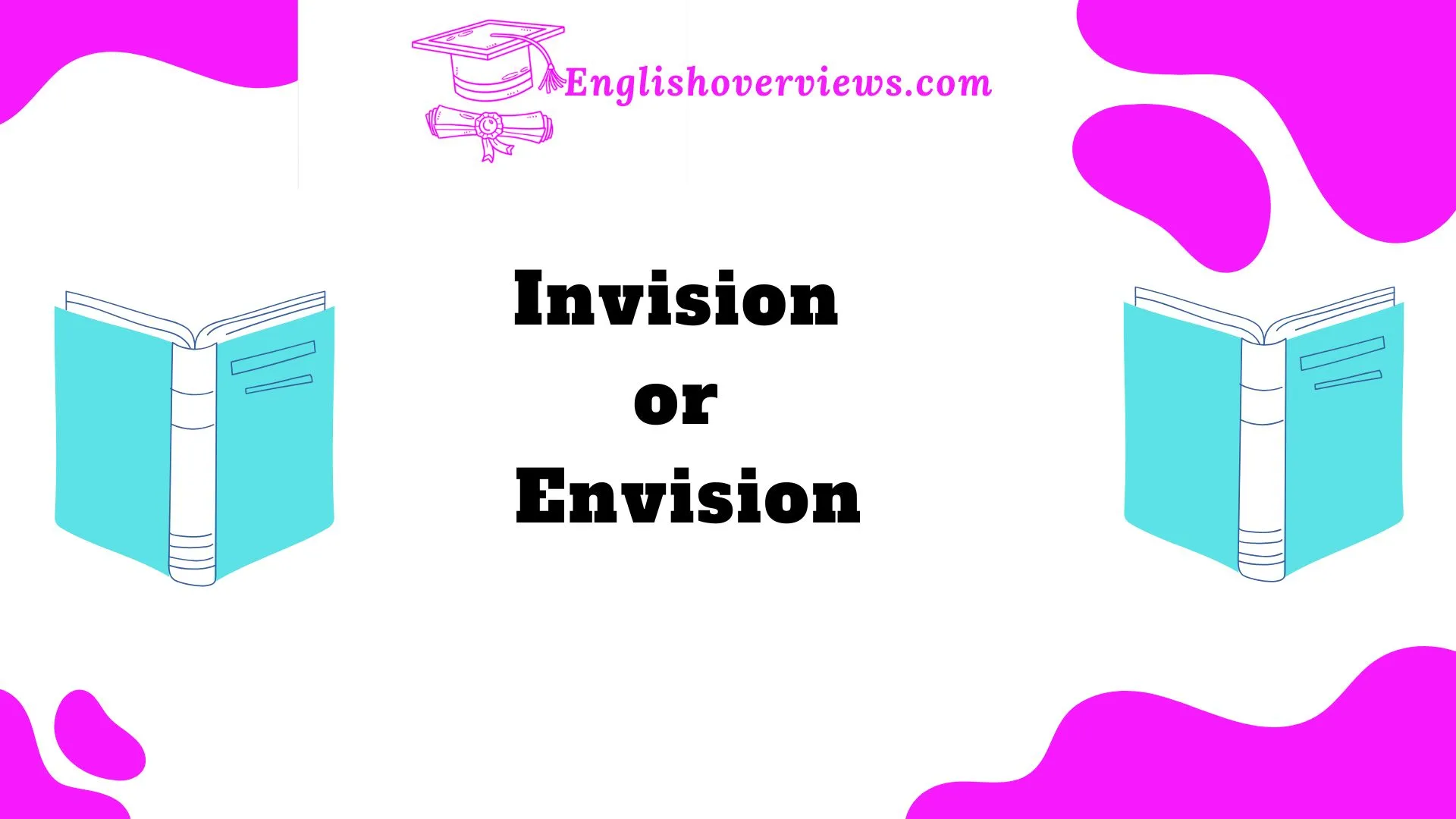Confused about whether to use Invision or Envision? You’re not alone. These words often trip people up due to their similar sounds and appearances. While one is widely accepted and used in the English language, the other is not recognized as a standard word.
This confusion becomes even more common in professional communication, where accuracy is key.
Understanding the difference between these terms is essential to avoid mistakes in writing and improve clarity. In this blog post, we’ll dive deep into the origins, meanings, and correct usage of Envision, explain why Invision is considered incorrect, and share practical tips to avoid this mix-up.
We’ll also explore how language evolves over time and examine the influence of branding and phonetics on common spelling errors.
Understanding the Confusion Between Invision and Envision
It’s easy to see why people get confused between Invision and Envision. Both sound similar when spoken and appear visually close when written. However, only “Envision” is correct in the context of standard English. Let’s break this down further.
Common Reasons for the Mix-Up
- Phonetics: Both words sound nearly identical when pronounced quickly, leading to misspellings.
- Brand Influence: Popular brands like “InVision” (a prototyping software) contribute to the widespread use of the incorrect term.
- Prefix Confusion: English has many words that begin with “in-,” such as “invest,” “invite,” and “include.” This creates a natural assumption that “invision” might also exist.
- Autocorrect Errors: Typing errors can easily convert “envision” to “invision,” especially on mobile devices.
Examples of Misuse
- Incorrect: “I invision a successful future for this company.”
- Correct: “I envision a successful future for this company.”
The Etymology and History of the Word “Envision”
To truly grasp the difference, let’s explore where the word “envision” comes from and why “invision” doesn’t exist as a standard term.
The Origin of “Envision”
The word envision originates from the Latin word “videre”, meaning “to see.” The prefix “en-” means “to cause to,” making “envision” literally mean “to cause to see.” It entered English usage in the late 19th century as a way to describe imagining or foreseeing something in your mind.
Why “Invision” Isn’t a Word
While “en-” is a common prefix in English, “in-” often means “not” or “into.” Combining “in-” with “vision” creates a term that doesn’t align with any recognized English rules or meanings.
The Impact of Language Evolution on Spelling and Usage
Language evolves, and with it, so does spelling and word usage. While this can lead to the creation of new words, it also results in misunderstandings and persistent errors like Invision.
How Language Changes
- Borrowing from Other Languages: English adopts words from many languages, often changing their spellings and pronunciations.
- Technology and Branding: Companies like “InVision” use creative spellings for uniqueness, unintentionally influencing everyday language.
- Phonetic Simplification: Over time, people simplify spellings to match how words sound, even if they’re not technically correct.
Real-World Case Study: The Influence of Branding
The software company “InVision” is a leading example of how branding affects language. Many professionals, especially in tech, mistakenly assume that “invision” is a real word because of its widespread use in design tools. This highlights the power of branding in shaping perceptions.
Correct Usage of “Envision” in American and British English
American English
In American English, “envision” is widely used to describe imagining or planning something in the future. Example:
- “She envisions a brighter future for her children.”
British English
The term is equally accepted in British English, though synonyms like “imagine” or “visualize” may also be common. Example:
- “The company envisions expanding into international markets.”
Quick Reference Table: Envision Across Dialects
| Aspect | American English | British English |
| Spelling | Envision | Envision |
| Usage Frequency | Common | Common |
| Preferred Synonyms | Imagine, Visualize | Visualise, Picture |
“Invision” as a Persistent Misspelling and Misconception
Even though “invision” isn’t correct, its persistence in informal writing and branding keeps it alive. Here’s why:
- Digital Influence: Brands like “InVision” normalize the incorrect spelling.
- Informal Writing Habits: In casual settings, people rarely double-check spellings.
- Autocorrect Challenges: Many devices don’t flag “invision” as incorrect, reinforcing the error.
How to Avoid This Mistake
- Use proofreading tools like Grammarly or Hemingway.
- Memorize this simple rule: “Envision has vision; Invision is fiction.”
Envision vs. Invision: Quick Reference Guide
To clarify things even further, here’s a handy table:
| Aspect | Envision | Invision |
| Definition | To imagine or foresee | Not a recognized word |
| Usage | “I envision success.” | Incorrect |
| Common Mistake | N/A | Used instead of “envision” |
| Recognition | Standard in dictionaries | Not found in dictionaries |
Expanding Your Vocabulary: Synonyms and Alternatives
Expanding your vocabulary can help you express yourself more clearly. Here are some alternatives to “envision”:
- Imagine: “I imagine a world without hunger.”
- Visualize: “Visualize your goals to achieve them.”
- Foresee: “The expert foresees major changes in the industry.”
- Picture: “Can you picture life on another planet?”
Using these synonyms appropriately adds variety and richness to your writing.
Conclusion
Understanding the difference between Envision and Invision is simple once you know the facts. While Envision is the correct and widely accepted term, Invision persists due to phonetics, branding, and informal habits.
By learning the origins of “envision,” avoiding autocorrect mistakes, and expanding your vocabulary, you’ll never confuse these terms again.
Remember: Envision success, don’t invision mistakes.
FAQs
1. Is “Invision” ever correct?
No, “invision” is not a standard word in English. It’s often a result of branding or spelling errors.
2. What does “envision” mean?
“Envision” means to imagine or foresee something in your mind, typically a future event or idea.
3. Can “envision” be used in both American and British English?
Yes, “envision” is widely accepted in both dialects, though British English may also use synonyms like “visualise.”
4. Why do people use “invision”?
The influence of branding (e.g., “InVision” software) and phonetics often lead to this mistake.
5. How can I avoid confusing “envision” and “invision”?
Use tools like spell checkers and memorize that “envision has vision; invision is fiction.”

Alyan Ashraf is the creative mind behind English Overviews, a platform dedicated to helping learners master the English language. Passionate about education and language development, Alyan specializes in simplifying complex English concepts, making learning accessible for students of all levels.











